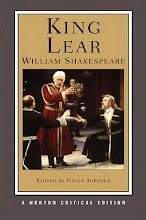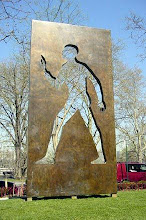Now if that didn’t confuse you…
There are threeish parts that I would like to talk about in relation to Gloucester and his two sons. The first is Act one Scene two, the second is Act three Scene seven, and the third is no particular act or scene, just Gloucester’s interaction with his son Edgar.
In Act one Scene two, Edmund (the bastard son) initiates his plan to remove his brother Edgar from the line to the throne, by reading a letter that he pretends Edgar wrote to him. He makes sure he is caught in the act of reading the letter by his father, Gloucester, who uses many sight and blindness references when referring to the letter.
“The quality of nothing / hath not such need to hide itself. Let’s see. Come, if / it be nothing, I shall not need spectacles.” (Gloucester, 1.2.35-35)
To a higher-level reader, this particular quote passage would poke you in the ribs and scream “blind to the truth.” It is really difficult to put what I’m about to say into words, but I will try. I really want to focus on “Come, if it be nothing, I shall not need spectacles.” Since Gloucester is told by Edmund that the letter is “nothing,” he believes the letter to actually be something of possible importance. But to follow along with Edmund he tells him that because it is nothing he doesn’t need glasses to read it. So, analyzing the quote I would have to say that “nothing: is the truth and because Gloucester does not put on his “spectacles” he is blind to it. Not sure if that makes sense, but it makes sense in my head.
This particular scene highlights Lear’s own disability to see his daughters (Regan and Goneril) true intentions. Both men (Gloucester and Lear) are blinded by words, whether they be spoken or written.)
- - -
In Act three Scene seven (the favored scene among Varsity English), Gloucester’s “vile jelly[s]” (3.71.1) (his eyes incase you didn’t know) are both forced out by the despicable Cornwall. I would like to discuss how after both his eyes are removed, the truth of the matter is revealed to him by Regan, as he calls for his son Edmund.Out, treacherous villain! / Thou call’st on him that hates thee. It was he / That made the overture of thy treasons to us, / Who is too good to pity thee.” (Regan, 3.7.107-110)
Now, because of his mental blindness to the truth of his betrayal by his bastard son Edmund, Gloucester has become physically blind, forever to wander and darkness and "smell" his way around.
But not really… Because his trustworthy son, Edgar, who had gone into hiding as a mad beggar comes to his aid and leads him to and fro. Unfortunately, Gloucester never discovers that this mad beggar that is leading him around is his son Edgar, so is still partially blind to the mental truth, thus losing both sons.
- - -
So I guess the general idea of sight and blindness is similar to that in the bigger story in King Lear. Both fathers are blinded by words, which lead to the loss of their children.
I'm being extremely vague in this post. But I'm running out of time. I may edit it later on if I somehow find a way to create more hours in the day.



No comments:
Post a Comment